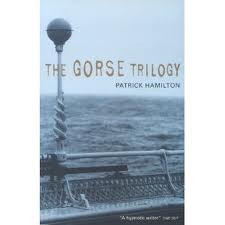
These two novels complete THE GORSE TRILOGY. They follow our anti-hero, Ralph Ernest Gorse, as he continues to con women out of their money.
MR STIMPSON AND MR GORSE is oddly named, as Mr Stimpson comes into the story only tangentially. Mr Gorse’s real prey is one Mrs Plumleigh-Bruce, a colonel’s widow with inflated ideas as to her own status. She is, as is common with every other character in this novel, completely unpleasant: vain, grasping, and calculating. Gorse convinces her of his probity by encouraging her to entrust him with small amounts of money initially (to bet on the horses for example). He eventually convinces her to become secretly engaged to him, and they spend a wild week in London, during which he encourages her to drink far too much. She entrusts him with £500, and he sends her back home to Reading, saying he will follow shortly. Needless to say he does not.
One very striking aspect of this novel is how much of it takes place in drinking establishments. Everyone is constantly either drinking or drunk. Patrick Hamilton clearly spent an ungodly amount of time in bars, as I don’t think I’ve ever read such detail or accuracy about pub culture, pub conversation, drunken dalliances, the taste of brandy, the effect of ‘Gin and It,’ Monday morning hangovers, etc etc etc. It kind of made me want to have a drink.
UNKNOWN ASSAILANT
The title made me very worried that here Ralph Ernest Gorse would finally mature from conman to serial killer. The atmosphere of these books is strangely suspenseful – or stressful might be a better term – and I was kind of worried this might be where it was going. However, bizarrely, this was the most cheerful of the books, and included, incredibly, a character who was not irredeemably bad! Amazing. Of course, we are immediately told that he is to die senselessly in the early days of the WWII, so fear not, this is still vintage Hamilton.
Gorse meets a rather dim barmaid, Ivy, and convinces her that he would like to marry her. He bamboozles her (through her stupidity and timidity); and then bamboozles her father too (but in this case through his cupidity and brutality), into investing in a fictitious theatrical enterprise. Once he has their money safely in hand, he takes Ivy to a lonely part of the countryside. You can see where I thought this was going to go horribly wrong. However, all he does is tie her up, tell her she has been swindled, and leave her to make her own way home.
At this she point, she meets the one not thoroughly objectionable character in the book, Stan, a lone telegraph boy, who takes her home, comforts her, and gives her the courage not to return to her horrible and vindictive father.
The last two books in THE GORSE TRILOGY continue to be bleakly funny, as:
Chelsea proper is, as is well known, despite its countless normal inhabitants, the favourite London resort of those who are obvious failures or of those who are obviously going to be failures before long. The failure is nearly always of an ‘artistic’ kind.
But I found that more than funny, they were bleak. I enjoyed them, but I am glad they are finished. For some reason I am not surprised that they were Patrick Hamilton’s last novels before he drank himself to death. The man who wrote the Introduction called these end-of-the-tether novels, and while I don’t know exactly what he means, I know exactly what he means.


